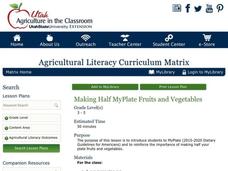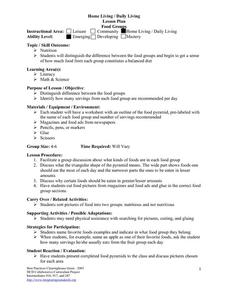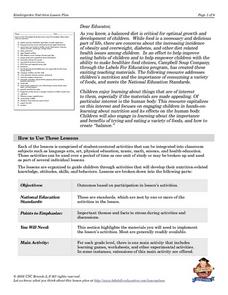Curated OER
Modifying Viscosity of Egg Yolk
Students investigate the effects of substances on the viscosity of egg yolks. In this viscosity lesson plan, students separate egg yolks from their albumen and then add different masses of albumen back to each egg yolk. They measure the...
Curated OER
Chef Solus Cooking Academy Game
Students evaluate human health by participating in an interactive activity. In this food choice instructional activity, students discuss the decisions they make each day in order to stay healthy with the food they eat. Students utilize...
Baylor College
Food Webs
Explore various ecosystems from around the world as your class discovers the interdependence of all living things. Using the provided sets of ecosystem cards, young scientists work in small groups building food webs to demonstrate the...
Curated OER
Food Fat
Students evaluate snack foods based on calories and fat. In small groups, they use this information to make informed and wise food choices. Students graphically represent the fat in a food by measuring the equivalent of the food fat with...
Curated OER
Calorie Calculations through Beach Activities
Beach activity separates babes from blobs! Your class learns about calculating the number of calories used during physical activity. A worksheet is provided in which the activity of five different people at the beach is listed for...
Perkins School for the Blind
Student Store
Vocational training activities are extremely important for learners with intellectual or physical disabilities. Here is a great idea that will help your class become skilled at money handling, basic economic concepts, interpersonal...
Agriculture in the Classroom
Making Half MyPlate Fruits and Vegetables
Establish healthy eating habits with a lesson focused around MyPlate's food recommendations and the importance of eating fruits and vegetables. Through class discussion and worksheet completion, scholars discuss the best choices of foods...
Curated OER
Human Body Lessons
Students read "The Magic School Bus in the Human Body" and discuss the importance of maintaining a healthy body. They create a hinge and joint paper skeleton, follow the journey of a hamburger through the digestive tract, jump rope and...
Curated OER
In Touch with Apples
Students read "How To Make an Apple Pie and See the World", the story of a girl who traveled the world to find the ingredients to make her apple pie. They conduct a series of interdisciplinary activities including testing their senses,...
Curated OER
Home Living/ Daily Living: Food Pyramid
What did you have for lunch? Did it contain all four food groups? Help your special education class make good food choices and recognize foods in each of the four food groups. They look at images and discuss the foods on the food pyramid...
Curated OER
Home Living/ Daily Living: Food Groups
What are the best foods to eat, and how much is too much? Kids discuss the importance of eating the right amount of each of the four food groups. They discuss the food pyramid and make meals by cutting and pasting foods from a magazine...
Baylor College
Do Plants Need Light?
Turn your classroom into a greenhouse with a instructional activity on plant growth. First, investigate the different parts of seeds, identifying the seed coat, cotyledon, and embryo. Then plant the seeds and watch them grow!...
Baylor College
Plant Parts You Eat
Plants provide a variety of delicious foods essential for human survival. In the fourth lesson of this series on food science, young scientists investigate common fruits, vegetables, and grains in order to determine which plant part is...
Baylor College
Bio Build-up
Trace pollutants through the environment in the seventh lesson of this series on the science of food. Looking at a picture of the plants and animals in an aquatic ecosystem, learners use dot stickers to represent harmful chemicals as...
Baylor College
They're Everywhere: Bacteria
Totally gross out your class with the eighth lesson in this series on food science. Explore the microscopic world of bacteria by taking swabs of different classroom objects and growing colonies in petri dishes. An engaging activity that...
Baylor College
What's That Food?
Get things cooking with the first lesson in this series on the science of food. Working in small groups, young scientists make and record observations about different mystery foods. These descriptions are then shared with the class and...
Baylor College
Healthy Snacks
Assess your pupils' ability to identify healthy food choices in the final lesson of this series on food science. Given five different food labels, young nutritionists will rank them from most to least healthy, supporting their choices...
Curated OER
The ABC's of Breakfast
Students identify the food group of various culturally diverse breakfast foods and discuss the importance of eating a healthy, well-balanced breakfast every morning. They then try different foods that begin with the letter A, B and C and...
Curated OER
Recipe Conversions-Enrichment Worksheet
A recipe for Chocolate Chewies, a no-bake cookie, is provided, but the ingredients are not written in useable amounts. Your cooking class must first convert them into useable amounts before preparing the treat. The final product acts as...
Baylor College
Digestion
Digestion is an amazing and complicated process that provides humans with the energy they need to survive. Lesson six in this series on the science of food uses sliced turkey and a meat tenderizer to demonstrate how enzymes help break...
Curated OER
Fiber - Adding it to the Diet - Skill Supplement
Food preparation that supports the concepts of adding fiber and water to the diet. Identify fiber, its sources and functions. National Standard 14.2.1 Identify the function of fiber Identify cellulose - non digestible fiber Discuss the...
Curated OER
Food Comparison PDF
In this health worksheet, students are led through lessons to become familiar with the dietary recommendations of the government.
Curated OER
Fat - A Concentrated Energy Source
The role of fat as a nutrient that provides a source of concentrated energy and is also necessary for the body to utilize other nutrients, namely some important vitamins.
Curated OER
Essential Nutrients - Daily Guides
List the recommended dietary guidelines and explain their function and implementation. (The guidelines are listed below) National Standards 14.3.1 Aim for fitness Aim for a healthy weight Be physically active each day
Other popular searches
- Nutrition Math Bmi
- Nutrition Math In
- Nutrition Math Preschool
- Nutrition Math Bm
- Nutrition Math 2nd Grade
- Nutrition Math 3rd Grade
- Nutrition Math Lesson Plans
- Math Nutrition
- Math and Nutrition
- Math Lesson Plans on Nutrition
- Math, Nutrition

























